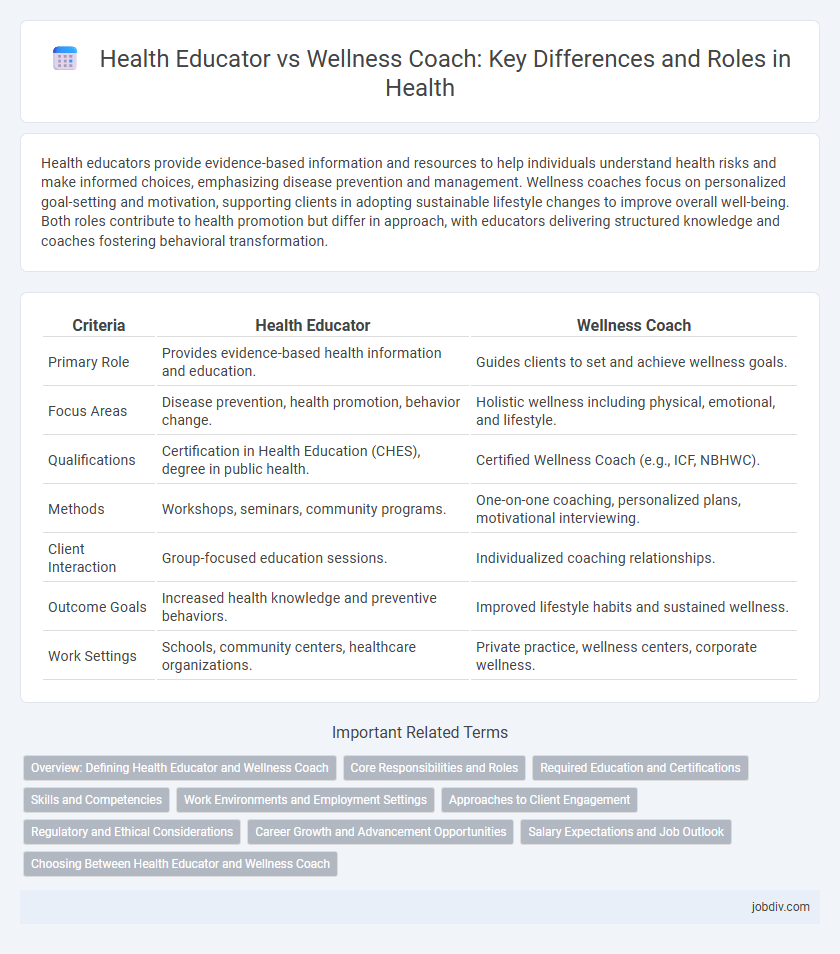Health educators provide evidence-based information and resources to help individuals understand health risks and make informed choices, emphasizing disease prevention and management. Wellness coaches focus on personalized goal-setting and motivation, supporting clients in adopting sustainable lifestyle changes to improve overall well-being. Both roles contribute to health promotion but differ in approach, with educators delivering structured knowledge and coaches fostering behavioral transformation.
Table of Comparison
| Criteria | Health Educator | Wellness Coach |
|---|---|---|
| Primary Role | Provides evidence-based health information and education. | Guides clients to set and achieve wellness goals. |
| Focus Areas | Disease prevention, health promotion, behavior change. | Holistic wellness including physical, emotional, and lifestyle. |
| Qualifications | Certification in Health Education (CHES), degree in public health. | Certified Wellness Coach (e.g., ICF, NBHWC). |
| Methods | Workshops, seminars, community programs. | One-on-one coaching, personalized plans, motivational interviewing. |
| Client Interaction | Group-focused education sessions. | Individualized coaching relationships. |
| Outcome Goals | Increased health knowledge and preventive behaviors. | Improved lifestyle habits and sustained wellness. |
| Work Settings | Schools, community centers, healthcare organizations. | Private practice, wellness centers, corporate wellness. |
Overview: Defining Health Educator and Wellness Coach
A Health Educator designs and implements programs that promote healthy behaviors through evidence-based information and community outreach, often working within public health settings or organizations. A Wellness Coach provides personalized guidance and support to individuals aiming to achieve their health and lifestyle goals by focusing on behavior change and holistic well-being. Both roles prioritize health improvement but differ in scope, with Health Educators targeting populations and Wellness Coaches focusing on one-on-one client relationships.
Core Responsibilities and Roles
Health educators design and implement programs to promote wellness and prevent disease by providing evidence-based health information and resources. Wellness coaches focus on personalized guidance, helping clients set achievable health goals, develop sustainable habits, and improve overall well-being through motivational support. Both roles require strong communication skills, but health educators typically operate in community or institutional settings, while wellness coaches work one-on-one or in small groups.
Required Education and Certifications
Health educators typically require a bachelor's degree in health education, public health, or a related field, along with certifications such as the Certified Health Education Specialist (CHES) credential. Wellness coaches may have diverse educational backgrounds but often pursue certification through accredited programs like the National Board for Health & Wellness Coaching (NBHWC) to establish professional credibility. Both professions emphasize formal education and certification to ensure expertise in promoting health and wellness effectively.
Skills and Competencies
Health educators demonstrate expertise in developing and delivering educational programs that promote public health awareness, utilizing skills in communication, research, and behavior change theories. Wellness coaches excel in personalized guidance, applying competencies in motivational interviewing, goal setting, and holistic wellness strategies to support lifestyle modifications. Both roles require strong interpersonal skills and knowledge of health promotion but differ in their approach, with health educators focused on population-wide impact and wellness coaches emphasizing individual client engagement.
Work Environments and Employment Settings
Health educators primarily work in community health organizations, schools, and public health departments, focusing on designing and implementing educational programs. Wellness coaches are commonly found in corporate wellness programs, fitness centers, and private practices, where they provide personalized guidance to improve clients' overall well-being. Both roles emphasize health promotion but differ in workplace settings, with health educators often employed by public or nonprofit agencies and wellness coaches operating in more individualized or corporate wellness environments.
Approaches to Client Engagement
Health Educators employ evidence-based teaching methods and structured programs to provide clients with comprehensive knowledge about disease prevention, nutrition, and lifestyle choices. Wellness Coaches utilize personalized motivational techniques and goal-setting strategies to empower clients in behavior change and sustaining long-term wellness. Both roles prioritize client-centered communication, but Health Educators focus on information delivery while Wellness Coaches emphasize ongoing emotional support and accountability.
Regulatory and Ethical Considerations
Health educators must adhere to standards set by organizations like the National Commission for Health Education Credentialing (NCHEC), ensuring compliance with ethical guidelines related to confidentiality, informed consent, and professional competence. Wellness coaches often follow codes of conduct developed by the International Coach Federation (ICF), emphasizing client autonomy, non-discrimination, and clear boundaries without requiring formal licensure. Both roles require understanding privacy laws such as HIPAA in the US and maintaining ethical communication to protect client well-being and trust.
Career Growth and Advancement Opportunities
Health educators often have clearer pathways for career growth through certifications like the Certified Health Education Specialist (CHES), leading to roles in public health organizations, schools, and corporate wellness programs. Wellness coaches typically advance by gaining specialized credentials such as the National Board Certified Health & Wellness Coach (NBC-HWC), enabling opportunities in private coaching, healthcare settings, and corporate wellness management. Both professions offer expanding prospects driven by increasing demand for preventive health services and personalized wellness strategies.
Salary Expectations and Job Outlook
Health educators typically earn an average salary between $45,000 and $65,000 annually, with strong job growth projected at 13% through 2031 due to increasing public health awareness. Wellness coaches can expect salaries ranging from $40,000 to $70,000, influenced by certifications and client base, with demand rising steadily as employers and individuals prioritize holistic health. Both professions offer robust opportunities, yet health educators often benefit from more stable employment in public and private sectors, while wellness coaches enjoy flexible, client-driven careers.
Choosing Between Health Educator and Wellness Coach
Choosing between a Health Educator and a Wellness Coach depends on individual needs for structured health knowledge or personalized lifestyle guidance. Health Educators provide evidence-based information on disease prevention, nutrition, and public health policies, often working in community or clinical settings. Wellness Coaches focus on motivation, habit formation, and behavior change tailored to personal wellness goals, making them ideal for ongoing support and accountability.
Health Educator vs Wellness Coach Infographic

 jobdiv.com
jobdiv.com